When Editor (and adoptee) Laura Dennis asked me to read the manuscript for Adoption Therapy: Perspectives from Clients and Clinicians on Processing and Healing Post-Adoption Issues, I jumped at the chance. And was blown away with new ideas and insights that will be helpful in my parenting journey.
When Laura asked me to write the foreword to Adoption Therapy, I aspired to do it justice. Below is my attempt, reprinted with permission from the publisher.
~~~~~
Foreword
It’s with both trepidation and humility that I compose the foreword to Adoption Therapy. You hold in your hand an extraordinary and incisive collection of writings about adoption and therapy, composed by many who have walked the long walk of facing trauma and healing from it. A majority of these contributors—and the editor herself—are adult adoptees.
Now if there’s one thing adoptive parents are known for in adoption circles, it is for doing more than their share of the talking. Accurately or not, adoptive parents are seen by some as the moneyed ones in the adoption “triad.” Accurately or not, adoptive parents are seen by some as the “winners” in adoption scenarios — they end up with their dreams answered while birth parents and adoptees suffer wounds that society doesn’t recognize. Accurately or not, adoptive parents are seen by some as the ones with the voice, with influence to mold adoption law and policy to their benefit.
And adoptive parents have been accused of speaking about adoption issues when perhaps they should be listening [case in point].
Hence my trepidation.
This notion of listening is why I encourage adoptive parents like me—and others curious about the possible effects of adoption—to pick up this book and read it thoroughly. We should be listening. We should give a temporary rest to our own thoughts and feelings and suppositions about adoption and create within us an open space to simply listen.
The Importance of Being Open
Being open to hearing a new point of view—maybe even a scary point of view—is an expansive state. Being open works best if one has healthy boundaries and appropriate permeability between self and not-self. It requires a healthy ego, one that doesn’t need to “win” to survive, one that recognizes its inherent value and accords others the same recognition. Being open means you have less of a need to defend your truth than you have curiosity to hear another’s.
Being open, however, does not mean there is no discernment. After creating space to hear others’ truths, and after listening and trying to understand a different perspective, it’s still all right to discern whether another person’s truth fits into your own—or not. And even if you decide “not,” it may be prudent to tuck away that perspective for a later time when your own evolving circumstances may cause you to look at the perspective again and anew.
As you turn these pages, I invite you to be open to the gifts and insights within, and to allow the possibility that not all chapters will look like gifts. Anything that strikes you strongly (and dare I say that could be every single powerful chapter?) is resonating for you, either positively or negatively charged, and indicates there is something there for you to look at—within you and from your own experiences.
Understanding Neonatal Trauma
As you read and understand, you’ll find gems like these quotes that will help you better understand the experience of having been adopted:
- “To be conceived without being intended, to be carried in the womb of a stressed mother facing a crisis pregnancy, leave lifelong traces that persist without an understanding of their origins.” — From Chapter 5: Heeding the Body’s Messages: Physiological Implications of Prenatal Trauma
- “Adoptive families tend to seek help from a counselor three times more frequently than other families.” — From Chapter 2: Red Flags that a Potential Therapist Could Do More Harm than Good
- “I felt like I was living under the terms and conditions of a contract I never signed.” — From Chapter 7: Perspective of an Adoptee Conceived by Rape
- “Start early teaching kids that feelings are like clouds moving through. No feeling is your last feeling. Feelings are not permanent.” — From Chapter 3: Approaches for Repairing the Wounds of Separation
- “Our lives are a dance between knowing who we are as separate beings and knowing ourselves as parts of the whole.” — From Chapter 3: Approaches for Repairing the Wounds of Separation
- On connecting with Nature: “Ida Rolf said that if you can’t get it from your mother, get it from the Mother—the earth.” — From Chapter 5: Heeding the Body’s Messages: Physiological Implications of Prenatal Trauma
- “But moving on is much different from healing.” — From Chapter 7: Perspective of an Adoptee Conceived by Rape
- “One classic example of ‘parentification’ would be an adoptive parent who constantly implores reassurance from the child that he/she is the ‘real’ parent.” — From Chapter 12: Co-Dependency in Adoptees
- On adoptee resilience: “We succeed not so much because of that original loss but in spite of it.” — From Chapter 3: Approaches for Repairing the Wounds of Separation
- “What these therapy modalities have in common is the goal of resolving past trauma at the level of the body/mind connection.” — From Chapter 12: Co-Dependency in Adoptees
Parents who adopted internationally may have been under the impression that a child would be nothing but grateful to the people who rescued him or her from abandonment or life in an orphanage. Surely it wouldn’t be traumatic for these “lucky” ones to land in a loving home. It would be a good thing!
As a mom via domestic adoption, that last quoted passage struck me because once upon a time, people adopting newborns thought we’d bring into our homes a Blank Slate Baby. Because they were infants, these brand new humans would come to us with no problem that our love couldn’t resolve. The babies didn’t have words yet, so clearly they wouldn’t have memories of their placement (which first involved a separation in order to make a new connection). Surely it wouldn’t be traumatic for these little babies to go from a chaotic and unstable place into a family that longed for them. As with international adoption, it would be a good thing!
But I’ve come to know by listening to adoptees that infants DO know. Young children DO know. They may not know in their brains, because it’s unclear how we encode events that happen before we can do the encoding through words and thoughts.
But their bodies know. Their body/minds know. The body/minds of infants and young children who were placed for adoption experienced chemical and hormonal changes, responding with unique and complex emotions that got encoded and stored. Evidence shows that the body/mind houses every experience we’ve ever had, even those that are preverbal. What we are hearing from brain scientists, therapists and adoptees themselves is that the memories of the trauma of a chaotic pregnancy and/or separation from source resides in the body/minds of adopted people.
What About Resilience?
So why might one adoptee turn out even-keeled and unflappable while another is deemed a hot mess? If the “primal wound” is real, why isn’t every single adoptee in therapy all the time?
We find the answer in the wisdom of Forrest Gump: Humans — like life itself — are like a box of chocolates. You never know what you’re gonna get. Because of the infinite number of influences that go into making a person into who she is, because of the complexity of the interactions among those infinite influences from pre-birth on—because of the enormity of it all we can’t identify any one thing that causes someone to be unflappable or a hot mess or anywhere in between.
Will your child be resilient? Who knows? It takes a lifetime to fully unwrap this metaphorical chocolate. Resilience and all other traits will emerge on their own timetables, being coaxed out or pruned based on life experiences and other factors. As your loved one’s nature reveals itself to you, you can best respond by being open to who she is and attuning to her moment by moment.
Attunement and the Adoptee
The longer I do this parenting gig, the more I hear from parenting experts about incorporating attunement. Attuned relationships mean we are in harmony with the other. Being attuned means we are willing and able to go into discord with our loved one, even when doing so is unpleasant and frightening. To be able to do this, it’s helpful to understand how others have handled such inner discord and come out on the other side.
I desire to be an attuned parent, yet I’m finding though the journey is even more difficult than any other I’ve experienced. I bet anyone who loves an adopted person would like to be able to walk alongside her loved one and help bear the load of whatever he or she is going through. To do this we hold the intention to continually tune in with him, with her.
And to do this we must first hold the intention to tune in with ourselves.
As You Turn the Pages
I ask you to open yourself to information and perspectives that may strike you as helpful, as scary, as possible solutions, as clues to a puzzle you’re trying to figure out. I ask that you begin by preparing within you an open space to really listen to people who have walked this path—before you begin the process of discernment. I suggest that you monitor your own reactions to each chapter, and ask yourself probing questions at any time you notice a strong reaction (why did that trigger me?). I recommend that even if you discard the gist of a chapter today, that you remain open to reevaluating it another day.
May we all strive to open, to listen and to attune when it comes to adoption issues and the people who are faced with them.
~~~~~
See/Hear Also
Adoption: The Long View Episode 11: Is a Baby a Blank Slate? Lesli Johnson, Adoptee & MFT, on the Neuroscience of Adoption
~~~~~
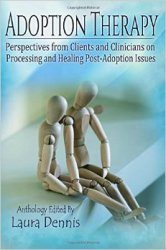
Adoption Therapy: Perspectives from Clients and Clinicians on Processing and Healing Post-Adoption Issues is available in paperback and Kindle editions on Amazon and other booksellers. Like the other contributors, I donated my work and have no financial stake in the success of this anthology.
Contributors to Adoption Therapy: Marcy Axness, PhD, Karen Belanger, Karen Caffrey, LPC, JD, Laura Dennis, Lisa Floyd, Rebecca Hawkes, Jody Haywood*, Lori Holden, MA, Mila C Knonomos, Krist Lado, Lesli Maul, LCSW, Brooke Randolph, LMHC, Suzanne Brita Schecker, EdD, LMHC, Raja Selvam, PhD, Lucy Chau Lai-Tuen*, Deanna Doss Shrodes, Corie Skolnick, MS, LMFT
* Guest posters to my #flipthescript series.


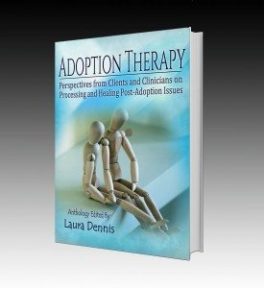
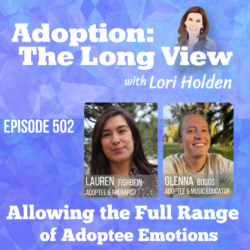
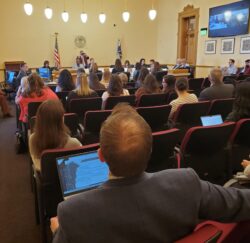
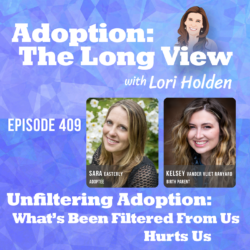

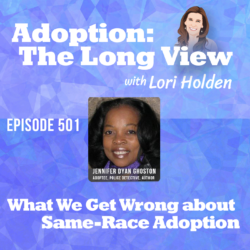

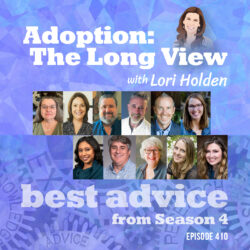
4 Responses
Nice job! I think you’ve captured the essence of why it’s important for people to recognize that everyone in the adoption triad has feelings that are not always good ones. I love that you admit that it’s difficult sometimes and that you’ve invited us on your journey.
Lori,
This is a beautiful, inspiring and thoughtful introduction. You touch on several powerful truths: that openness requires good boundaries and an ego healthy enough to withstand difference, that resilience varies among all people, and that attunement as a parent is probably the hardest job there is!
For adoptive parents to listen and hear adoptees speak their truths requires all of the above. It’s a tall order and takes a lot of work, but it’s work worth doing since openness promotes growth and healing. Not listening or hearing does the opposite, as we all know so well.
I look forward to digging into the book. I’m going to order it right now! Thanks to all of you who have contributed to it.
Looking forward to reading this! Thanks for sharing!
Important, relevant information and a book that is filled with vital information for anyone connected to or by adoption. Thanks Lori!